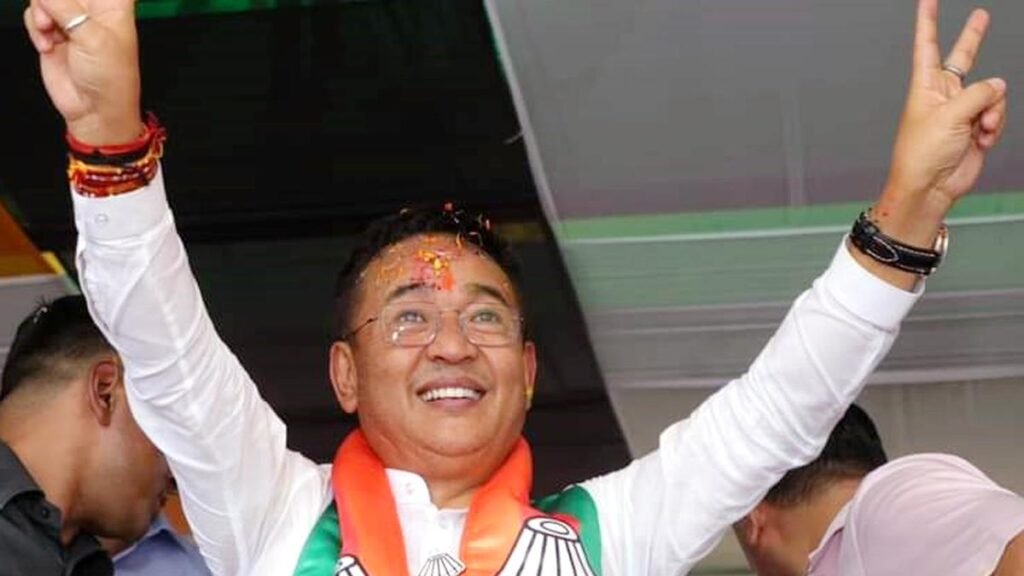Prem Singh Tamang Sworn in as Sikkim Chief Minister
Prem Singh Tamang, popularly known as P.S. Golay, took oath as the Chief Minister of Sikkim on [date]. This development marks a significant political shift in the state, as Tamang’s Sikkim Krantikari Morcha (SKM) party secured a decisive victory in the recent assembly elections, defeating the long-standing Sikkim Democratic Front (SDF) government led by Pawan Chamling.
Tamang’s ascension to the chief ministerial position comes after a prolonged legal battle. He was disqualified from contesting elections and was even jailed in 2017 for corruption charges, which he and his party supporters claim were politically motivated. However, his conviction was later overturned by the Supreme Court, paving the way for his participation in the electoral process.
In his inaugural address, Tamang outlined his government’s priorities, including promoting sustainable development, improving healthcare facilities, enhancing educational infrastructure, and boosting tourism in the state. He also emphasized the need for good governance and transparency in administration to fulfill the aspirations of the people of Sikkim.
This development holds significant implications for the political landscape of Sikkim, as Tamang’s tenure is expected to bring about substantial changes in governance and policy-making. It also reflects the growing demand for new leadership and ideologies in the state, as evidenced by the defeat of the incumbent SDF government, which had been in power for over two decades.
As Tamang assumes office, all eyes will be on the implementation of his government’s agenda and the fulfillment of promises made during the election campaign. The coming years are crucial for Sikkim’s socio-economic development, and Tamang’s leadership will play a pivotal role in shaping the state’s future trajectory.

Why this News is Important:
Political Shift in Sikkim: The swearing-in of Prem Singh Tamang as the Chief Minister of Sikkim marks a significant political transition in the state, with his party, the SKM, defeating the long-standing SDF government in the recent elections.
Legal Battle and Controversy: Tamang’s journey to the chief ministerial position has been fraught with legal challenges, including disqualification and imprisonment on corruption charges. His eventual exoneration by the Supreme Court underscores the complex interplay between law and politics in India.
Policy Priorities: Tamang’s inaugural address outlined key priorities for his government, including sustainable development, healthcare, education, and tourism. These areas hold critical importance for the socio-economic development of Sikkim and will be closely monitored by stakeholders.
Implications for Governance: The change in leadership in Sikkim is expected to bring about policy changes and administrative reforms. Tamang’s emphasis on good governance and transparency signals a departure from the previous regime’s style of functioning and reflects evolving voter preferences.
Future Trajectory: As Tamang assumes office, the focus shifts to the implementation of his government’s agenda and the delivery of promises made during the election campaign. The coming years will shape Sikkim’s socio-economic landscape, making this news pertinent for residents and observers alike.
Historical Context:
Prem Singh Tamang’s swearing-in as the Chief Minister of Sikkim is a culmination of a prolonged political journey marked by legal battles and electoral victories. Sikkim, a northeastern state of India, has historically been dominated by the Sikkim Democratic Front (SDF) party, led by Pawan Chamling, who held the chief ministerial position for over two decades.
However, in the 2019 assembly elections, the Sikkim Krantikari Morcha (SKM), led by Tamang, emerged victorious, ending the SDF’s long reign. Tamang’s ascent to power is notable due to his personal history. He faced disqualification from contesting elections and subsequent imprisonment on corruption charges in 2017. However, the Supreme Court’s intervention overturned his conviction, allowing him to re-enter the political arena.
Tamang’s victory reflects changing political dynamics in Sikkim, characterized by growing disillusionment with established political entities and a demand for new leadership. It also highlights the complexities of Indian democracy, where legal battles and electoral processes intersect, shaping the course of governance and politics in the country.
5 Key Takeaways:
| Serial Number | Key Takeaway |
|---|---|
| 1. | Prem Singh Tamang, popularly known as P.S. Golay, sworn in as the Chief Minister of Sikkim after his party’s victory in the 2019 assembly elections. |
| 2. | Tamang’s ascent to power comes after a prolonged legal battle, including disqualification and imprisonment on corruption charges, which were later overturned by the Supreme Court. |
| 3. | His government’s priorities include promoting sustainable development, improving healthcare and education, and boosting tourism in Sikkim. |
| 4. | Tamang’s victory signifies a political shift in Sikkim, ending the long-standing rule of the Sikkim Democratic Front (SDF) party led by Pawan Chamling. |
| 5. | The change in leadership is expected to bring about policy changes and administrative reforms, with a focus on good governance and transparency in administration. |
Important FAQs for Students from this News
Q: Who is Prem Singh Tamang?
- A: Prem Singh Tamang, popularly known as P.S. Golay, is the Chief Minister of Sikkim, having taken oath recently.
Q: What party does Prem Singh Tamang belong to?
- A: Tamang is associated with the Sikkim Krantikari Morcha (SKM) party, which secured victory in the recent Sikkim assembly elections.
Q: What were the legal challenges faced by Prem Singh Tamang?
- A: Tamang faced disqualification and imprisonment on corruption charges in 2017, which were later overturned by the Supreme Court.
Q: What are the priorities outlined by Prem Singh Tamang for his government?
- A: Tamang’s government priorities include promoting sustainable development, improving healthcare and education, and boosting tourism in Sikkim.
Q: What implications does Tamang’s victory have for the political landscape of Sikkim?
- A: Tamang’s victory signifies a political shift in Sikkim, ending the long-standing rule of the Sikkim Democratic Front (SDF) party led by Pawan Chamling.
Some Important Current Affairs Links

















